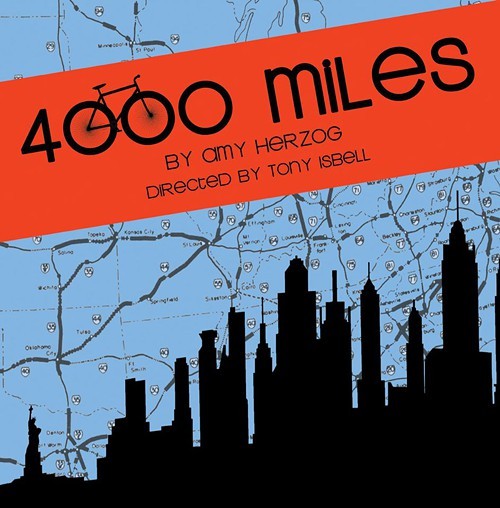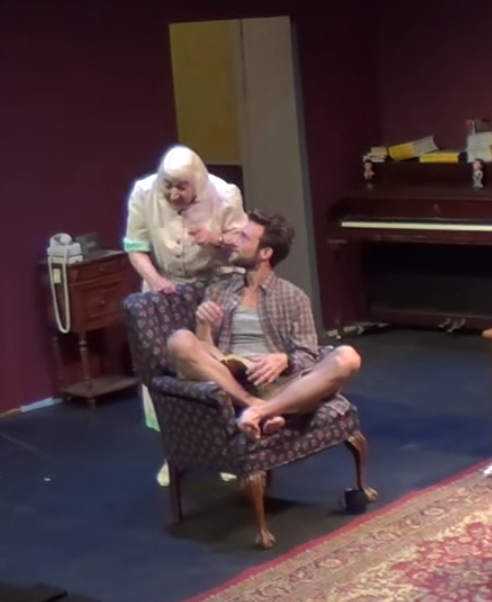“Gentle” is the word I hear over and over again in reference to 4000 Miles, Amy Herzog’s funny, thorny play about geographical, emotional, temporal, and political distance across generations. Director Tony Isbell dropped the word when we chatted online. It’s popped up repeatedly in conversations with friends who’ve seen the play at TheatreWorks. Even New York Times critic Charles Isherwood called it a “gently comic drama” in his review, so there must be something to the idea that it’s a gentle play. But that isn’t how I experienced 4000 Miles. The play I saw was an uncomfortably real snapshot of a generational moment, a sound thrashing of lifestyle-lefties and a similarly-bracing critique of our elders and their astonishing ability to idealize the past. 4000 Miles is a quiet play, mostly. There’s no sustained shouting or violence to speak of, though death looks out from every corner of the room. Genuinely sweet moments are shared between a self-absorbed millennial and his grandmother, an old lefty at the tipping point of senility. But gentle isn’t the first word I’d choose to describe this subtle, one-act reminder that the reward of a long life is outliving everyone who might attend your funeral.
Did I mention that the show is also funny? It is. What it’s not is tightly plotted. Nor is it full of the archetypal characters that tend to populate the classic American family drama. To that end, 4000 Miles — a 2011 Pulitzer Prize finalist — is a chamber piece, more meditation than assault. But it’s an uneasy meditation, almost never serene.
The play opens with a scruffy, baggage-laden Leo waking Vera, his elderly grandmother in her Greenwich Village apartment at 3 a.m. The last thing she expected was an early-morning visit from her Left Coast grandson, and she doesn’t seem all that happy to see him. Leo has been cycling across the country with a friend, but when that friend died in a horrible accident on the road, he broke off communication with his family in Minneapolis and went off the grid.
Leo’s not intentionally malicious, but the young trustafarian is a natural manipulator: a wounded rugged outdoorsy-type quick to use his personal tragedy if it buys some sympathy or helps get the hot Chinese girl who looks like his adopted sister into bed. He takes up residence with his grandmother on a temporary basis, but makes her promise to not tell the family where he is.
Over the course of the play we watch Leo lose his girlfriend Bec, making one final douchey request to “remember how our bodies were together.” We also witness an attempted hook-up with a rich girl named Amanda who flips out when she discovers she’s in the huge, rent-controlled apartment of a card-carrying Communist. Amanda says she doesn’t think she can have sex in a Communist’s house, allowing that she’s usually kind of slutty. Her drunken anti-Communist rant is one of the show’s best set pieces. Replace the word Communist with any racial descriptor and the monologue would leave audiences slack-jawed. Then again, Amanda is Chinese, and there’s family history.
4000 Miles took its first Off-Broadway bows about three months before the Occupy Wall Street movement moved into Zuccotti Park. I mention that because somehow that real-world occurrence seems more like the ending of Herzog’s play than its actual ending. She uses the outdoorsy Leo and the urban Vera to look at how far the easily-identified tropes of the American left had evolved. Class-conscious collective action had become a lifestyle choice for people who can afford to protest GMOs and oil companies with their purchasing power. There is some suggestion that Leo is growing by the play’s end. It’s not hard to imagine him leaving for his new job out west only to get caught up in the massive street protest brewing in Manhattan. Nor is it hard to imagine him moving on following a fashionable arrest during some clash with the New York police.
Every character in 4000 Miles is a prisoner of perspective, Leo most of all. He’s loveably disheveled, despicably self-centered, and difficult to like. His grandmother, Vera, can be abrasive and muddled, but she clearly has the more sympathetic role, and Karen Mason Riss is spectacular in the part.
Christopher Joel Onken is completely believable as Leo, although his more cloying antics come across as being downright sinister. Carly Crawford is also effective, if a little stilted as Leo’s girlfriend Bec. Then again, if the show has a thankless part, that’s it.
Ron Gordon’s scenic design gives the impression that Vera’s not-so-Manhattan Manhattan residence is infinitely large on the inside. That’s a quibble, not a deal-breaker.

